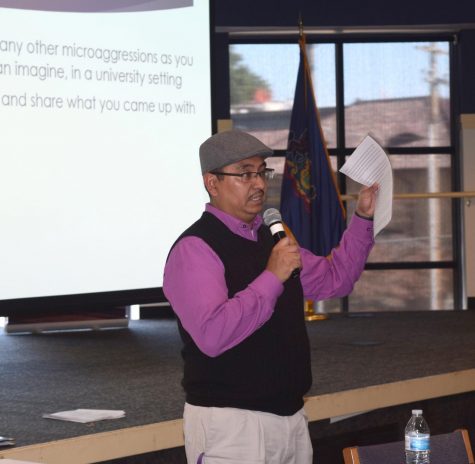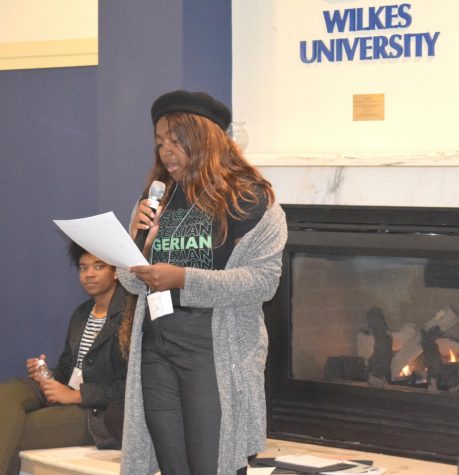Third annual diversity conference focuses on social inequalities
Keynote speaker Dr. Blake Mackesy discussed with attendees about disruption of the status quo through critical thinking and education.
The Center for Global Education and Diversity recently held its third annual undergraduate conference at Wilkes University titled, “Understanding and Addressing Social Inequalities.”
The conference coordinator, Erica Acosta, explained that the goal of the conference was to “consider how we can make conscious efforts to change the way we think about inequalities.”
Seven presenters from Wilkes University and other local universities led workshops that discussed the forms of inequality present in society, and how to adjust responses to these injustices.
The keynote speaker, Dr. Blake Lamberti Mackesy, a member of the Wilkes School of Education, began the conference with a discussion of diversity, inclusion and intersectionality.
“We’re equal,” she said. “Me, you, all of us are equal in our knowledge. We’re all experts in our knowledge, so I expect you to use your voice, to speak your truth.”
She then asked students to get up and introduce themselves to someone they did not know, encouraging them to get to know the students from other universities or students from their own university whom they did not know well.
Mackesy encouraged students to lean into the discomfort of the discussions that would be had in that room, saying, “Disruption is something we celebrate in this room on this day.”
Mackesy shared music videos and situations that addressed social inequalities and then passed a microphone around to students to lead a discussion, largely motivated by the responses of students in the room.
This discussion moved through conversations of identity, inequality, inclusivity and power in both the United States and worldwide.
Identity, as she explained, is a group in which people perceive themselves as being members of, or are welcomed into. These groups can be defined by religion, race, gender, sex, socio-economic status or language.
Mackesy defined intersectionality as, “The concept of concentric, intersecting, matrix-like circles where these identities cross.”
According to Mackesy, power tied the two concepts together.
“Not all identities share equal power in this society. Step back. Every culture has different expectations and norms surrounding power, so what’s right for here in NEPA may be different in different regions of our country, and certainly different across the world.”
These topics moved into the smaller workshops that went on throughout the day. In the workshop led by Dr. Jim Calderone, students took part in a discussion about white privilege and how they are impacted by it. He challenged white students to be aware of their mindset and to grow in their understanding of their privilege.
In another workshop, Dr. Samuel H. Schmidt presented a session about athlete activism in America. He looked at different people and teams such as the U.S. Women’s Soccer Team, the Miami Heat basketball team, Muhammad Ali and Billie Jean King, and discussed how the empowerment of athletes results in more athletes addressing social injustices. Thus, this puts these injustices on a larger stage.
“The Diversity and Inclusion Conference was an amazing opportunity to discuss important but possibly uncomfortable topics like white privilege and microaggressions with people of several different backgrounds,” said Rashonda Montgomery, a sophomore student at Wilkes University. “Each workshop left you with something to think about. It was an impactful learning experience.”
One workshop by Jose F. Sanchez, from the University of Scranton, was about “Recognizing and Responding to Microaggressions and Implicit Bias and the Messages that They Send.”

Jose Sanchez, assistant director of the Cross-Cultural Centers at the University of Scranton, spoke about microaggressions.
This workshop highlighted what microaggressions and implicit bias are, as well as ways to respond to them. The students listened to and watched examples of these microaggressions and engaged with each other on how to reduce their occurrence.

Mmachi Dimoriaku, senior theatre arts major, read a fictional story about microaggressions to the students.
The workshop “Factors Affecting Persistence in Earning a Baccalaureate Degree for First-year Black Male Students Attending Predominately White Institutions in Northeastern Pennsylvania,” lead by Yerodin Lucas of Marywood University, discussed the qualitative research study of black male students attending higher education institutions in the region.
Tanya A. Pyke led the workshop, “The Financial Solutions to put to use: Establishing a foundation.” This was especially important to college students who are beginning to navigate their professional careers with debt looming overhead. Pyke discussed habits for students to begin practicing while they are still in school.
“It is all of our responsibility to disrupt, disrupt the status quo, the status quo was created by those who hold power to keep things the way they are,” Macksey said at the end of her presentation. “It is all of our responsibility to shake that up, to think critically about that and educate yourself.”
Macksey encouraged students to work together to make the world a better place, saying, “We need to work to empower ourselves and others. This walk is too isolating if we try to do it alone. We need a community of like-minded people to support us through this path.”
This conference is held yearly at Wilkes University and is open to all students across campus.
Sean is a sophomore communication studies major who started as a staff writer in the fall of 2018. Sean currently works as the Assistant News Editor, a...